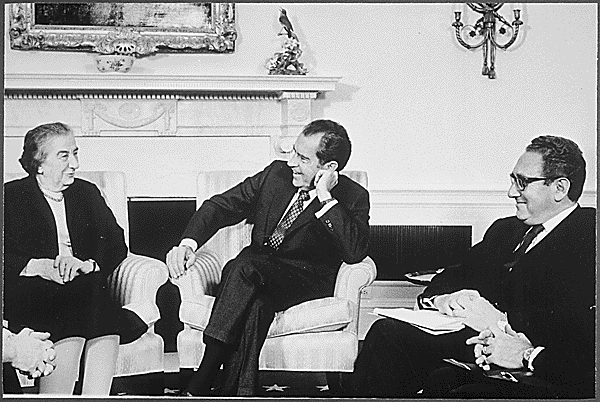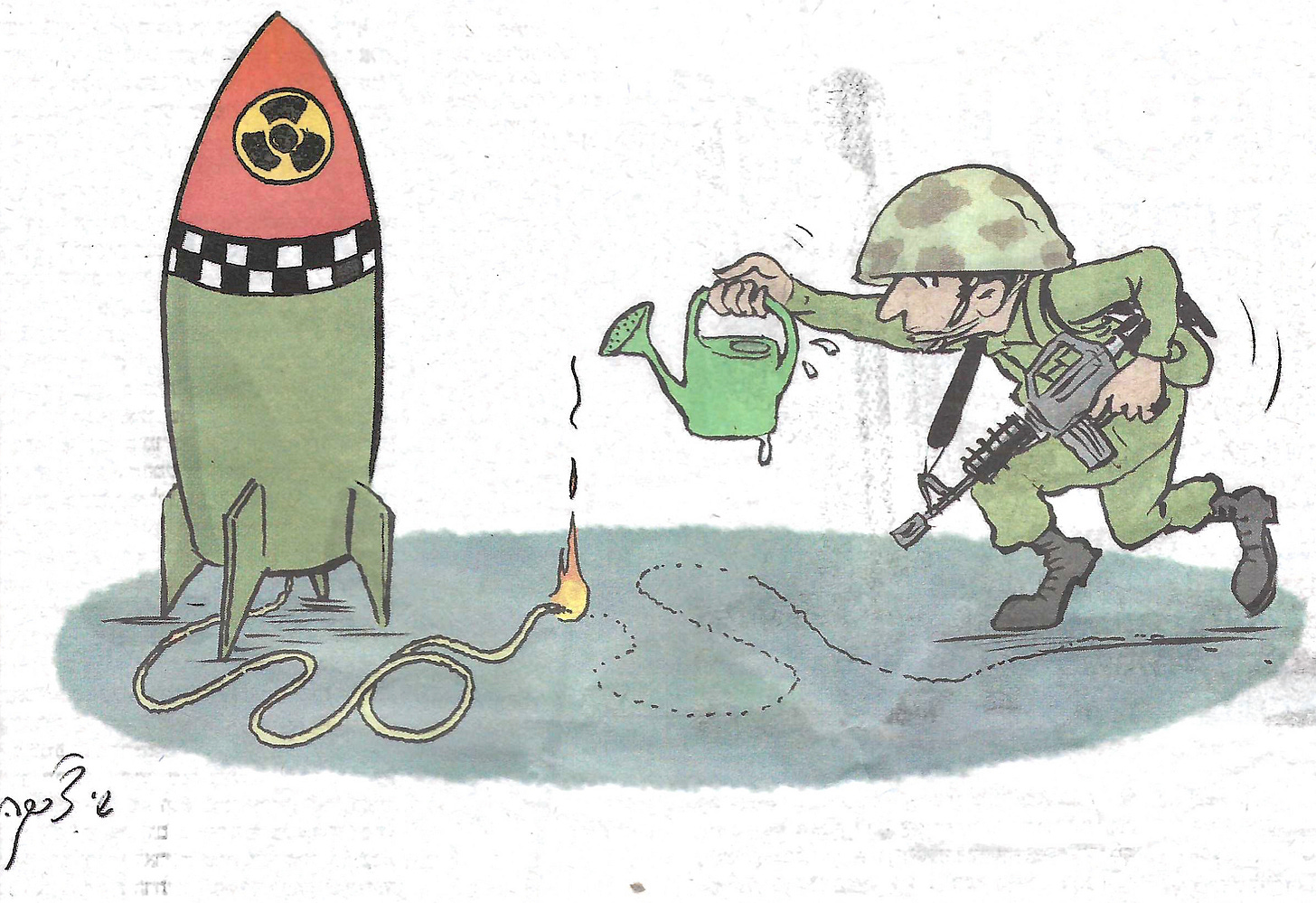Did the Begin Doctrine Just Die?
And if it did, what comes next?

In June 1981, my (very newly minted) wife and I were on our honeymoon in Hawaii. One afternoon, as we were walking back from the beach to our hotel, we paused at one of those sidewalk newspaper dispensing machines, and through the glass front, quickly read the headline of the local Honolulu paper.
“Israel Bombs Iraqi Nuclear Reactor,” the headlines screamed.
We both burst out laughing. That ridiculous claim was about as plausible as a story about Martians in the National Enquirer. These locals, it seemed, would believe anything.
The story of Israel’s destroying the reactor at Osirak is now well-known. What most of us did not understand then, however, was that while the reactor had been destroyed, something else had been born.
In June 1981, Israel established what has been informally known, ever since, as “the Begin Doctrine.”
The Begin doctrine stated that Israel will never allow one of its enemies to obtain a weapon of mass destruction. That was why Menachem Begin destroyed Osirak in 1981 and Ehud Olmert destroyed a Syrian reactor under construction outside Damascus in 2007. And it was to ensuring that the Begin Doctrine remain intact that Benjamin Netanyahu devoted much of his attention during his twelve years in office.
What Israelis have learned in the past couple of weeks is that Netanyahu failed.
Discussion of Netanyahu’s failure erupted after a column in Yediot Ahronot written by Ehud Barak a few weeks ago. Barak wrote that Israel no longer has a viable military option for preventing Iran from crossing the nuclear threshold, and that the Mullahs are marching steadily forward on their quest. Israel needs the US to develop military plans to stop Iran (Barak said that not only does the US have no such plans, it also has no interest in developing them); furthermore, he said, Israel is going to have to recognize its increased dependence on the US, and to work hard to deepen its ties to America.
As for us citizens on the street, Barak intimated, we’re entering a new period. Instead of counting on the military to keep Iran at bay, Barak said, Israelis are now going to have to learn to live in the shadow of a nuclear enabled mortal enemy.
Hard though it may be to imagine, given the tenor of discourse in the United States these days, the claim that something massive in Israel’s fortunes is shifting has not become a partisan political issue in Israel. In fact, there seems to be agreement, from left to right. On the left, Haaretz recently ran a headline that read, “If, or when, Iran develops a nuke, Israel will have to balance reassuring the public, deterring the Iranians and securing American backing.” At the other end of the spectrum, Makor Rishon, right of center (but interestingly by and large no longer bemoaning Bibi’s departure from the Premiership), ran a lead story this weekend entitled “A Vision of the Nuclear Days” (chazon akharit ha-gar’in), a variation on the commonly used Hebrew phrase “A Vision of the World to Come” (chazon akharit ha-yamim).
It was a cute play on words, but it was undoubtedly lost on very few readers that Haggai Segal, the paper’s military correspondent, was foretelling an era entirely unlike the one we currently know. Just as the world to come bears little resemblance to the world we now inhabit, the headline intimated, the world which we Israelis are about to enter is going to be radically different from the one to which we’ve grown accustomed.
That headline and the cartoon accompanying it in Makor Rishon are portrayed above. Look at the cartoon carefully. A fairly pathetic Israeli soldier, not looking terribly optimistic, is using a garden watering-can to stop the fuse to a nuclear bomb. Note, also, that much of the fuse has already been burned.
The point of the cartoon is that the hapless soldier is engaged in an utterly futile endeavor. He’s much too little, much too late.
Israelis’ increasingly expressed sense that their military has become hapless is the subject of an upcoming column.
The Jerusalem Post, known these days for being very thoughtfully centrist, agreed with Makon Rishon’s Haggai Segal: Israel has no viable plans for stopping Iran, at least for now, but it could develop them, and is likely to do so. It’s worth reading the entire JPost column on its own for a fuller analysis, but for the moment, one point is worth highlighting. Here, in the words of the JPost:
… Naftali Bennett was not wrong after becoming prime minister when he said that his predecessor, Benjamin Netanyahu, was so focused on speaking against Iran that he neglected to take action to stop it. The fact is that Netanyahu’s strategy failed.
And as for where to place the blame on the American side, it was both Obama and Trump who got us where we are, intimates Yaakov Katz, editor of the JPost.
The Israeli defense establishment pretty much agrees that while the 2015 nuclear deal, the JCPOA, was a bad pact, convincing Donald Trump to withdraw from it in 2018 did not achieve the desired result. Not only did Iran not cave to the sanctions nor return to the negotiating table, it insisted that if America pulled out of the deal, it could also violate it.
The implications of this changed Israeli sense of self are virtually limitless. The Israel with whom the UAE and Bahrain were anxious to sign normalization agreements is an Israel that was not afraid. It is an Israel that has technological knowhow born of that sense of “we can do anything.” It’s an Israel that—since they are equally terrified of a nuclear Iran—countries like Egypt, Saudi Arabia, the UAE, Bahrain and more want on their side. It’s an Israel that invents and imagines, builds and dreams, because existential threats are a thing of the past, and don’t suck the oxygen out of the air.
But what if that is no longer true? What will be the impact on Israel’s relationship with other countries once they decide that alliances with Israel don’t really protect them? Even if no one ever presses any buttons, what will be the impact of a new generation of Israelis’ not having that sense of security, that aura of certainty, that feeling of invulnerability? Will they have what it takes to live the way early generations here lived, determined to make it work, despite everything, because history had shown them what happens when the Jews don’t have a state?
Or, since they will be in the army almost a century after the Shoah, will that history be too far removed to shape them?

Of course, much could change. There could be regime change in Iran. Israel could have military options of which Barak is unaware. Other sorts of pressure might lead Iran to abandon its nuclear aspirations. But none of these seem terribly likely.
What is most likely is that Israel is going to need America once again, perhaps desperately so. Israel’s political leadership is going to have to dance carefully to build relationships with two parties that see eye to eye on virtually nothing, while also re-cultivating a long atrophying relationship with American Jews.
That means that there’s also an opportunity here. One can understand American Jews’ unwillingness or inability to accept that the Palestinian question has no solution now; they may be right, or wrong, or naive, or not—but one can understand. One can understand that given that most don’t know Hebrew, most of the richness, creativity and variety of Israeli cultural and Jewish life isn’t accessible to them. That, too, has no quick solution.
But defending Israel against Iran, defending the Jews against a hate-filled venomous threat—surely, on that, at least, we can all agree and once again work together? Israel shares no border with the Iranians; Israel’s only sin as far as the Iranians are concerned, the reason it must be destroyed, is that it is a Jewish State.
A century ago (96 years ago, to be precise), Hitler wrote Mein Kampf, and nonetheless, the following decade, Germans elected him. He had hidden nothing about his plans. He just banked on his instinct that no one who wasn’t on board would care enough to stop him. He was right. While Europe burned, Britain closed the borders to Palestine. America, too, closed its own borders, and with the exception of one protest of mostly Orthodox rabbis, American Jews were mostly silent. That historical record is clear.
We’re about to find out if we’ve learned anything since then. In just a handful of years, more than half the world’s Jews will live in Israel. That hasn’t been the case since the Babylonian exile of 586 BCE; in other words, that hasn’t been the case in 2500 years. And just as it’s about to happen, is the world going to allow Iran—which also hides nothing about its plans—to go nuclear, with the express intent of destroying what will without question be the center of the Jewish world?
This time, will American Jews get America to do the right thing? Will they at least try? Can Israeli leaders mend fences with American Jews to help make that happen? Do sufficient numbers of young American Jews care enough to make this a priority? Does the sense of mutual responsibility that has long been the core of Jewish peoplehood still mean enough to sufficient people?
No one can know with certainty the answers to any of those questions. But one thing we do know:
This time, we cannot afford to fail. Israel is our last chance.
Deborah Harris, the founder and CEO of Jerusalem's Deborah Harris Agency, is without doubt the premier literary agent representing Israeli authors in the international marketplace. In this conversation, Deborah regales us with the story of how she launched her career by following Ehud Yaari into Lebanon in the middle of the war in 1982, desperate to get him to write a book, but instead got herself arrested by the Israelis (she also got the book).
More seriously, she reflects on the meteoric rise in popularity of Israeli authors like Amoz Oz, David Grossman, A B Yehoshua and Meir Shalev, and shares her frustrations that the list of premier Israeli authors contains so few women. And perhaps most ominously, she describes the changes now unfolding for Israeli authors, who are recognizing that their days of having a market and an audience in America are may well be behind them.
This excerpt of our conversation is being made available to everyone. The full conversation will be available later this week to paid subscribers to Israel from the Inside.
Our twitter feed is here; feel free to join there, too.





